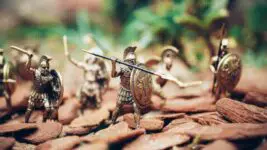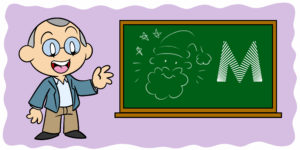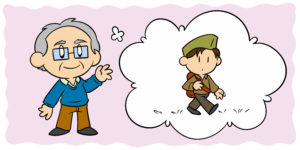The flashback is a great storytelling device, allowing you to send the reader back to witness first-hand the formative moments of a character or event. Comedy, action and even horror stories make frequent use of flashbacks, but while they’re common, they can be difficult to get right.
We’ve talked before about the structure of a flashback, but in this article I want to discuss four crucial decisions that can spell the difference between ‘glimpse into the past’ and ‘badly executed exposition’. I’ll explore why writing a believable version of a story’s past is difficult, and how you can ensure it rewards your efforts.
Decision 1: Should you adjust tense in your flashback?
One way to immediately communicate that the reader is in the past is to change the tense of your writing. Chuck Palahniuk writes the present day events of his novel Choke in present tense, and the flashbacks in past tense. Strangely, the opposite also often works to good effect.
Flashback:
The little boy smiled back at all the angry faces glaring in at him. And the little boy blew kisses.
Present:
I feel my heart ache, but I’ve forgotten what that feeling means.
– Choke
This has to do with the way the story is experienced. The events of the present, the ‘real’ events, have to be processed as they happen. Flashbacks have already happened in their entirety. There’s no new information; they can be dipped into and experienced immediately.
Changing the tense of your writing is a great way to set a flashback apart.Click To TweetThe literal past = past, present = present works too. Either way the delineation helps to constantly remind the reader where in time they are, leaving the author free to write convincing situations and characters without constantly signposting the flashback.
Of course, writing convincing flashback characters is its own challenge…
Decision 2: How will you regress your characters?
People both ‘grow’ and simply ‘change’ as they age, so it can be incredibly difficult to write believable younger versions of your characters in flashback.
Writing your protagonist’s younger self? They should be unique, not incomplete.Click To TweetIn Terry Pratchett’s Night Watch, Clint-Eastwoodesque police commander Sam Vimes is thrown back into his own past. The book plays out as a quasi-flashback, with Vimes constantly meditating on the reality of his past versus his memories of it, and the relevance of events to his future.
Most interestingly, Vimes is left in command of his younger self. Young Vimes is unsure of himself, lacking the steely resolve and supreme competence he’ll have in later life. As the story goes on, the reader sees young Vimes develop towards where he’ll be in the future but, crucially, he remains a believable character in his own right.
Young Vimes is never a shadow of his future self, but a fully formed person of a different age who is no less real. No matter how short your flashback is, this is the impression you have to give. If your flashback characters seem like half-finished versions of their future selves, the reader won’t buy it.
That was always the dream, wasn’t it? ‘I wish I’d known then what I know now’? But when you got older you found out that you now wasn’t you then. You then was a twerp. You then was what you had to be to start out on the rocky road of becoming you now, and one of the rocky patches on that road was being a twerp.
– Night Watch
To get this effect you have to make some hard decisions. If you haven’t already, sit down and write out your character’s defining traits. Decide how they developed, remembering that no person is created by a single moment. Vimes is a deeply cynical character, his sense of duty and will to protect the innocent tempered by loss and regret. His younger self is therefore more hopeful but less driven.
“That’s a nice song,” said young Sam, and Vimes remembered that he was hearing it for the first time.
… “As I recall, they used to sing it after battles,” he said. “I’ve seen old men cry when they sing it,” he added.
“Why? It sounds cheerful.”
They were remembering who they were not singing it with, thought Vimes. You’ll learn. I know you will.
– Night Watch
Don’t write who you think your characters were in the past, write new characters that could believably turn into them. If you don’t make flashback characters real, fully fleshed-out personalities then the idea of your character’s past is undermined.
Decision 3: How will you make the past seem real?
It can be fun to milk the dramatic irony in flashbacks, setting up little references to the ‘present’ for the reader to notice and enjoy. If, however, you want to write a believable flashback then you should avoid this at all costs.
You know that old phrase ‘Those who don’t remember the past are condemned to repeat it’? Well, I think those who remember the past are even worse off.
– Choke
Just like your flashback characters, the events of the past need to be believable as valid events. If the past feels like a joke based on the present, the reader will lose all sense that the characters are real people who have lived real lives.
Your character’s past needs to be as real as their present - don’t skimp on the details.Click To TweetThink of all the friends and relationships you had in the past. All the events that seemed huge at the time. Our lives are a procession of those events, and if your flashback only addresses the relevant aspects of the future, it will ring hollow. Throw in a friend, relationship, or concern that belongs solely to the past. Maybe the character enjoys a TV show, or is having relationship trouble; anything that will cement the reality of their previous life. Of course flashbacks are concentrated on key moments, but how long do you think you could look back on a past event before something specific to that time was at least mentioned?
And remember that it is you looking back…
Decision 4: Which perspective will work best in your flashback?
It’s important to decide whose perspective the flashback is from. Our memories are subjective, so if you’re writing in the first person or through the lens of bias then you need to think about how a character sees their own past. Who do they think they were, and how can you let the reader see the differences between their memory and the reality?
One way to do this is to bring in a second voice, whether in the flashback or commenting on it, to show a few holes in the biased account. In Night Watch this is provided by the monk Lu-Tze, who dissuades Vimes from assuming his younger self already possesses the qualities needed to grow into a good man.
You owe it to yourself, Commander. Right now, out there, Sam Vimes is learning to be a very bad copper indeed. And he learns fast.
– Night Watch
Don’t worry if you can’t find a way to provide this second voice; evidence speaks loudest, so no matter how much spin a character puts on a situation, the reader will still see what’s actually happening. A ladies man who could never get a date, but always has an excuse for his past self, will be quickly identified by the reader.
If you’re writing in the third person this will be less of a problem, but be careful to tether your reader to the emotions in the scene. It’s like taking a date to a party: your reader doesn’t know anyone in the past, especially if you’ve regressed your characters well, so make the extra effort to introduce them.
Flashbacks depend on knowing your world
In the end, flashbacks, like so many aspects of writing a story, come down to planning. The more you’ve thought about your characters and their world, the easier it will be to write a convincing flashback. Remember that flashbacks are just another scene in another setting. Don’t be tempted by gimmicks or cliché, and don’t write a slightly altered version of the present. Try to see the characters in your flashback as people in their own right, as complex and interesting as the people you’re going to make them become.
Realistic flashbacks will help maintain a reader’s suspension of disbelief, but there are other ways to lose it. Try Are You In Danger Of Losing Your Readers’ Suspension Of Disbelief? for tips on keeping your readers engrossed in your world. And if this article has you thinking about your characters’ past, try Nail Your Character’s Backstory With This One Simple Tip to dig even deeper.
Do you think flashbacks are a useful storytelling device, or is it cheating to just show the reader what went before? Whatever your opinion, I’d love to hear from you in the comments.






6 thoughts on “The 4 Decisions That Will Help You Write An Amazing Flashback”
I always feel that a few, very well used flashbacks can be great, but they need timing and should only exist in moderation. But they are certainly hard to get right.
Hi Valdemar,
Thanks for sharing your thoughts. You’re right about flashbacks being difficult to write, but hopefully we’ve made things a little easier.
Best,
Rob
I wrote a story that I want to get back to, about a barren woman in a Medieval setting. Being barren is viewed as a curse and she is blamed for blighting grain and turning a cow’s milk supply dry. Her failure to conceive has big implications for her life and relationships all around, especially when food supplies are failing. She is not free to walk through the fields or milk a cow. I think a flashback showing the bullying and rejection she suffered is better placed after her character is known to the reader and her current situation understood. She is the protagonist. As a flashback, the information about how the locals think has been established as the story unfolds. The accusations made against her, which seemed farfetched to the modern-minded reader, take on a more sinister meaning with more impact if the flashback scene is felt as an attack upon someone who is known and liked. When I reread the story I had a strong feeling that I should write the flashback at a particular point soon after the antagonists have hauled her in front of the authorities.
I think flashbacks are a useful storytelling device.
It sounds like you made the right call there, Rosamund. Obviously, I’m not familiar with this project, but from the way you talk about it, I’m wondering if you could go even further with the order of events. Is there a version of this story where you start at the end and then move back towards the beginning, perhaps?
– Rob
Thank you, Rob. My barren woman story comes from 2014 and my writing skills have developed since then. However, the plot and concept are strong and I will return to it and I have put a copy of my letter and your reply with it. Meanwhile, I am writing a novel and so still polishing my skills. Previously I started editing some of my stories and my skills there are greatly improving. Standout Books articles for writers are the best support ever. They make a writer think the right way by giving the means to achieve certain effects rather than giving a simplistic list of dos and don’ts.
Thanks very much, Rosamund, I’m glad you find our articles useful. While we try to give practical advice, I do think it’s necessary to explore the theory behind it, otherwise you’re only ever discussing how to solve a single, specific problem, rather than addressing the underlying principles of why the solution works and how to apply it more widely.
– Rob